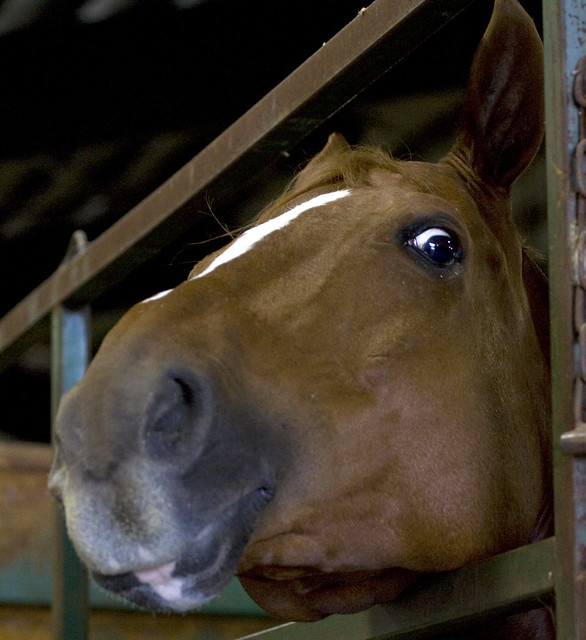
There are (somewhat) unconfirmed reports that all the facilities in Canada that slaughter US horses are stopping production as of this weekend. The rumor is that the European Union (the biggest buyer of US horse meat) has started actually residue testing US horse meat and finding that much of the meat has unacceptable levels of veterinary drugs.
The only thing that surprises me about this is that it took so long. EU members are notoriously finicky about "chemicals" in their food (consider all the fighting over GMO foods, and they have some of the strictest pesticide use laws in the world).
The EU released this brochure back in June. Page 5 has the most relevant bit: "Residue monitoring requirements for non-EU countries wishing to export food of animal origin to the EU: ...a centrally co-ordinated residue monitoring plan must be in place." There is, of course, no such thing in the US for horses, because horses are not treated like meat animals.
Allow me to go off on a tangent for a moment:
There are some people trying to build a slaughter facility specifically for horses right here in the community I live in. It's sort of a hot topic right now.
I recently read an infuriating op-ed in the local newspaper (the June 30th 2012 issue of the Hermiston Herald, although I didn't read it until last month). A local woman named Letitia Kidder, who supports having a horse slaughter plant in Hermiston, wrote what I'm sure she thought was a moving story about her first horse when she was a child, Whiskey, and why it was important that we always have the option of selling horses for slaughter.
Her horse went lame, and was (her words): "diagnosed with advanced navicular disease in both front feet, a crippling and painful disease... Her parents had already spent quite a bit of money on the veterinary diagnosis and care with special shoeing... then medication on top of that..." (emphasis mine).
Ms. Kidder then goes on to explain that she kept the horse on "a horse aspirin-type medication" for awhile, but couldn't keep him as a pet because "she would need a horse to ride," and her family couldn't afford two horses.
"The safe and affordable option was for him to be sold for meat purposes," she writes.
"Affordable"? For her 10-year-old self so she could have the luxury of a riding horse? Yes, certainly. But "safe"? For who? Not for Whiskey, he got death that was stressful at best, and terribly inhumane at worst, at the hands of people who didn't give a sh*t about him, her "beloved" pet. Not the French people who ate some steaks with who knows what level of phenylbutazone.
She, and a number like her in the community I live in, are still using the old argument that we "need" horse slaughter so that lame, drugged-up pet horses have a place to go (as if there were no other options). Except that the same horses they say are "saved" by slaughter, aren't supposed to be allowed to go in the first place. "Whiskey" probably wouldn't have even been bought by our local kill-buyer because of his lameness. And he certainly shouldn't be going to slaughter after all the 'bute he was given.
Sorry Ms. Kidder, your family would have had to suck it up and pay a vet to humanely euthanize Whiskey, or ask a neighbor to borrow a gun and a bullet. You would have had to spend money instead of make fifty bucks or whatever pittance you got from the carcass of your "little sorrel quarter horse with a heart of gold." (Seriously, she wrote that in her article advocating horse slaughter).
So. Residue monitoring of horse meat.
Here is how it works: kill-buyers want fat, healthy horses that they can buy cheap from the newspaper or auction, put on a truck and ship to Canada as soon as possible. Turn around is often less than a week; sometimes horses are bought and put on a truck the same day. The faster a kill-buyer turns around "product", the less s/he has to spend on feed, and the less likely a horse will be injured, go lame, or start showing signs of communicable disease, any of which will get it turned away at the border.
Horses that go to auction could be drugged with all kinds of things that the EU will test for later. 'Bute and Ace are so common, most horse owners have some lying around the barn, even though they're supposedly prescription-only.
There is no incentive for a horse seller to disclose that they 'buted their horse before the sale so it wouldn't look lame. There used to be no incentive for a kill-buyer to ask, either, as long as the horse passed the (very basic) USDA requirements for shipping (no runny nose, no blindness, and no lameness), it didn't matter. But now that shipments are actually being tested, that's going to change. And I have a hard time seeing ANY kill buyer who is willing to pay to have horses' blood tested for residues. Not only is such a test (relatively) expensive, but it would have to be sent to a lab, which would add days to turn around time. Unless the price of horse meat drastically increases, this change in policiy in the EU will make it not worth it for a horse trader to ship horses to Canadian slaughter plants. Hell, it probably wouldn't even be worth it if there was a plant right here in Hermiston.
If the EU really is going to continue to monitor imported US horse meat for drug and pesticide residues, the horse slaughter industry as we know it will end. And I won't miss it at all.

No comments:
Post a Comment